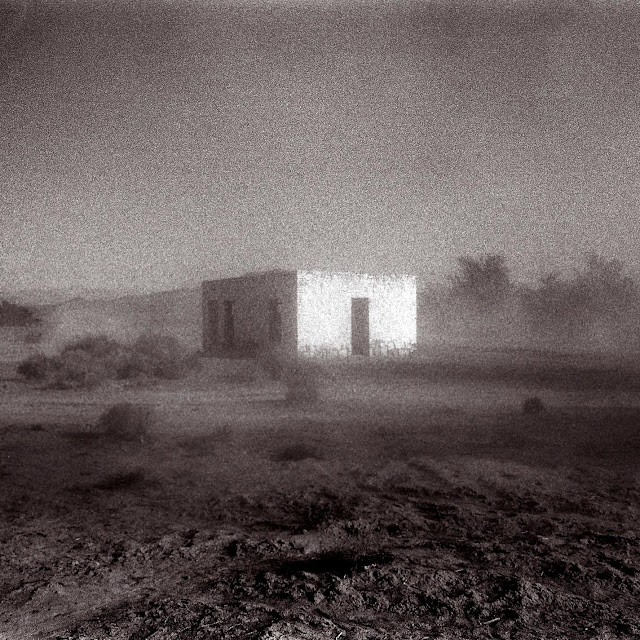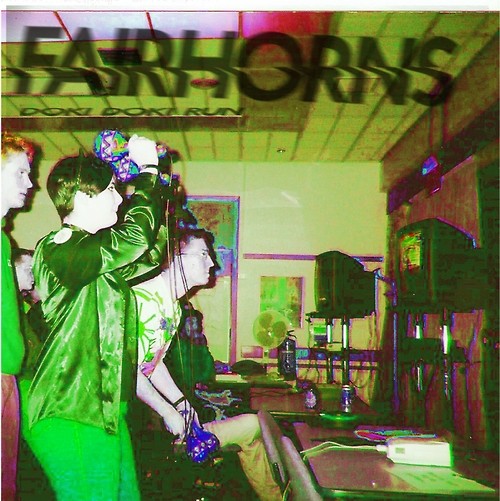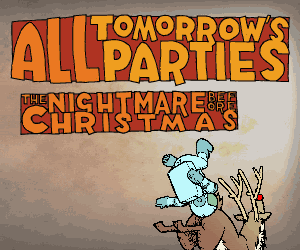
Reticently, she murmurs: "Hi, we're Dawn Hunger." If the dissipated scattering of person may seem as torpid as one may feel having scoffed down all manner of roasted grossness come Sunday lunchtime, then she soon turns ravenous. She prowls the opening to the WCs, the door leaking a slight light in which she is occasionally caught. She falls to her knees, laddered tights losing a few more rungs as though vampiric being evanescing in its artificial radiance, only to arise in swift, spasming regeneration. She flails her veiled arms possessed, as though some chiropteran specimen were snared within. Demoniac, she's a maniacal glint in each eye. This is interpretive dance more than owt else, and it's devilish enough already. Yet that she performs from below in this faintly Colosseum-like round adds the sense that these be the reverberations to resound out from down some hellish pit. Unlike the Inferno though, tonight is tinged with the finiteness of life itself – it is ever doomed to end. This sonic torturing of the less intrepid – those that stand unamused and motionless at the bar – is only momentary. And soon the dastardly sprite seemingly living within Inglis – one only inspired once gazes converge upon her svelte figure – will retire to slumber. That moment is not now.
This eve of eccentricity feels inspirited with the distilled essence of Hallowe'en – that much is immediately apparent: Inglis' voice bedevils in the very same way that insistent trick or treaters torment, as it flitters whimsically; morbidly even between Shirley Manson quasi-melodious shriek and Dreijer Andersson groan. Elements of gloomy early PJ and the intimidatory ethos of Ritzy Bryan are swilled about in the cauldron, too, as she moves with a most broody confidence, contorting her body as though nobody were watching. Granted, few are concertedly watching this spasmodically malevolent spawn of the darkest parts of popular culture, but still. Inglis is a captivating focal point, and one upon which Andrew Hung focusses intently.
The project's writer and producer is, quite bizarrely, uninvolved throughout. He applauds ever pause; sure. His sneakers stick to, and unstick from, the floor in acute synchronicity with the every blobby undulation across which Inglis writhes; naturally. But that he merely observes ensures he assumes the air of a malefic overlord, and imbues the outfit itself with the impression of the darkest pop act ever to have roamed NW6 post-gloaming. Indeed, Hope Of The States once mourned the angels to float above this murky place. Conversely, these be the demons within.
As such it was somewhat unsettling that Hung's artwork to accompany their first recording unleashed, Stumbling Room, was quite so vibrant, given the abnormally macabre necromancy at its dark heart. Similarly, both he and they seem strangely nice. Too nice to conjure stuffs this dismal in mood, anyhow. Same goes for Hung's slightly more fulltime endeavours: quite how the affable characters he and Benjamin John Power always appear to be once came out with the post-glitch apocalyptica of Street Horrrsing again greatly bewilders. But musically, Dawn Hunger are altogether more rudimentary: beyond the almost impenetrable contorted beats and contused wails little discernible music lies to rest. These are incisive anti-instrumentals, and in the luring of the cataclysmic comes charm. However it may be described, it's undoubtedly more D.I.Y. than the über-polished fanzine replacements lining the bar...
Their half-hour incorporates elements of everything from Boredoms, to Le Tigre, to the primordial drones of The Knife. It breeds antagonism, off which Inglis in turn feeds. Some trepidatious and others altogether disinterested, we're right where she wants us. And this disconnect only heightens the surreality of the whole thing. "Climb, climb, up I go" she snarls, creeping the stairs quiet, before tumbling down a short flight for Stumbling Room. It seethes an unapologetic terror, much as her performance hinges around the unhinged and is provoked by apathy, and proves danker than the darkest of sunless underpasses. These may be early days, but one already suspects many a great, dim night to come; the sort only wiled away in Lynchian dreams. And I'm thrilled to have stumbled into this one.























